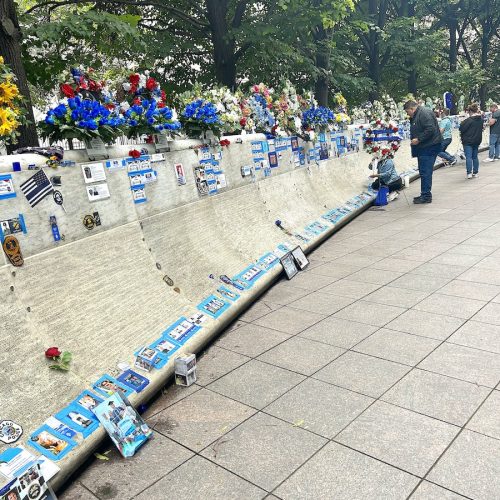During a trip last week to Washington, DC to attend the Candlelight Vigil to honor law enforcement officers who died in the line of duty, my wife & I sat in the chilling rain on the National Mall facing the U.S. Capitol to hear various dignitaries read the names that have have been inscribed during the past year on the Walls of Remembrance at the National Law Enforcement Officers Memorial. My dad, Arvin Kays, was one of those names.
He became a police officer in Indianapolis shortly after getting out of the Navy. After serving only 3 years, he sustained multiple injuries when his patrol car was struck in an intersection, sending him headfirst into a concrete wall. He nearly died, but instead became permanently disabled physically & cognitively until succumbing to his injuries 22 years later.
It’s been a long time since his death, but visiting the Walls & seeing his name etched in stone amongst over 24,000 other officers, dating back to 1786, made for a special moment of remembrance. But I have to admit, I’d never even heard of the Memorial or the Walls before. Decades ago, I’d seen the Vietnam Wall, the memorials for World War II, Korea, & other soldiers, but had no idea that there was such a tribute to fallen police officers.
Everyone knows about the annual Memorial Day on the last Monday of May to honor military personnel who died in service to the nation. But did you know that we also have a National Police Officers Memorial Day annually on May 15th? I didn’t. Memorials & Memorial Days are important because they not only commemorate individuals, they honor what they represent—selfless service, sacrifice, & courage on behalf of others. Hopefully, such memorials cause us to pause & be thankful because their heroism protects us from enemies, foreign & domestic.
In the city where our church is located, the Trenton War Memorial at the public library was dedicated on Memorial Day in 2011. I was invited to offer some words & prayer at the ceremony that day. Here’s part of what I said:
It’s easy to forget things. How many times have I left the house without my wallet? Or I’m walking with my wife into the store, & she’ll ask, “Did you lock the car?” I hate that. It was only a few seconds ago, & I can’t remember?! Or she’ll bring up some conversation from a week ago, & I don’t have a clue what she’s talking about. I tell her, “I’ve slept since then.” I run into people at church, & I’ll forget who they are. One time, I introduced myself to a man, & asked for his name. He said, “You were just at my house last night!” That’s embarrassing!
Few things are truly worth remembering. What was so newsworthy today is quickly forgotten tomorrow. But some things are worthy of remembrance. So we establish memorials for those things. For those names on this monument, they gave the ultimate sacrifice. They are worth remembering.
Throughout the Bible, God’s people are instructed to stop & recall what He did for them, because God knows it’s easy to forget. That’s why He gave us reminders, instituting festivals & meals to mark important events like the Passover. He instructed people to set up piles of stone as memory markers, like when the Israelites crossed the Red Sea on dry ground. He called for the public reading of Scripture so people would remember all God had done for them.
But the most well-known memorial He’s given us is called The Lord’s Supper, or communion. It’s a simple meal that followers of Jesus Christ share in regularly to remember His sacrifice. He said, “Do this in remembrance of me.” So as we eat the bread, we remember His body broken for us; as we drink from the cup, we remember His blood shed for us. It’s one of the church’s most sacred moments. Different churches have different traditions about communion, but at our church, we share in it every week to honor Him & reflect on what He did for us—because that’s how important it is.
Jesus said in John 15:13, “Greater love has no one than this: to lay down one’s life for one’s friends.” Of course, what’s really noteworthy about that is Jesus laid down His life for His enemies too—for everyone who has ever sinned against God, rejected His Word, & rebelled against His will. He paid the penalty of death for our sins so that we could live forever. And that’s why the cross is more than a symbol of death & a reminder of sacrifice—it’s a symbol of hope—because the cross & His tomb is empty. He is alive! That’s why crosses decorate tombs—it’s not just a memorial of death, but a marker of hope.


